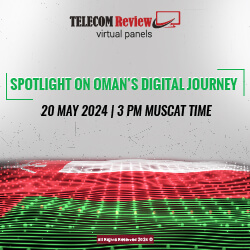Recognizing the pivotal role of ICT and telecom in shaping the future, nations across the globe have embarked on visionary journeys, aiming to harness the power of digital technologies to propel their development agendas forward. These visions, often encapsulated in comprehensive strategies and roadmaps, serve as guiding beacons, steering countries through the complexities of the digital age.
The Need For ‘Visionary’ Strategies
Between 2022 and 2030, the global green technology and sustainability market is forecast to grow. In 2022, the size of this market amounted to roughly USD 13.76 billion. By 2030, it is expected to peak at almost USD 62 billion, increasing at a compound annual growth rate (CAGR) of 20.8% from 2023 to 2030. Thus, the need for a comprehensive, sustainable ICT vision across nations has emerged.
An ICT vision consists of a strategic framework that outlines the aspirations and objectives for leveraging information and communication technologies (ICTs) to drive socioeconomic development and enhance national competitiveness. These visions are underpinned by a robust policy framework covering areas like broadband expansion, data protection, and cybersecurity. Additionally, they emphasize infrastructure development, innovation ecosystems, digital skills and education, e-government, digital inclusion, and cybersecurity to ensure equitable access, participation, and protection in the digital society.
The projected growth in global digital transformation spending highlights the increasing importance of 'Vision' initiatives like Saudi Vision 2030. Given that digital transformation expenditure is expected to rise from USD 2.15 trillion in 2023 to USD 3.9 trillion by 2027, the need to embrace digital technologies to drive economic development and competitiveness is vital.
ICT/telecom-centric visions are essential as they enable countries to diversify their economies away from traditional sectors, create employment opportunities, enhance productivity and competitiveness, empower citizens through digital inclusion, and position themselves for future technological advancements.
‘Visions’ Around the Globe
The various 'Vision' initiatives across different countries share a common objective—driving sustainable development and prosperity through strategic planning and leveraging digital transformation. Saudi Vision 2030, for instance, focuses on diversifying the Saudi economy away from oil dependency and promoting social advancement through initiatives such as privatization, foreign investment, and enhanced education and healthcare, underpinned by a strong emphasis on ICT development.
Similarly, Malaysia's Shared Prosperity Vision 2030 (SPV 2030) aims to achieve fair and equitable growth across all segments of society, recognizing the transformative potential of ICT in driving inclusive economic development.
Singapore's Smart Nation initiative exemplifies the integration of technology and innovation into governance and daily life, aiming to enhance aspects such as quality of life, economic competitiveness, and citizen engagement through digital infrastructure and citizen-centric services. India's Digital India Campaign and the Digital India Act (DIA) of 2023 demonstrate a concerted effort to digitally empower citizens, improve access to government services, and foster economic growth through ICT adoption and regulation. Egypt Vision 2030, Thailand 4.0, and Indonesia Vision 2045 similarly prioritize ICT-driven strategies to achieve sustainable development, economic diversification, and social inclusion.
In Africa, Kenya Vision 2030 and Rwanda Vision 2050 outline long-term development blueprints focused on economic transformation and knowledge-based growth, highlighting the importance of ICT in driving progress towards these goals. Collectively, these 'Vision-focused' initiatives underscore the critical role of ICT in shaping the future trajectory of economies, societies, and governance structures, emphasizing the need for strategic planning, investment, and collaboration to harness the full potential of digital transformation for sustainable development.
The Role of Telcos in ‘Visionary’ Initiatives
Telcos are instrumental in building and expanding digital infrastructure, including broadband networks and mobile connectivity, enabling ubiquitous access to digital services. For example, Saudi Telecom Company (stc) has been actively involved in expanding broadband infrastructure and rolling out high-speed internet services across the Kingdom to support the vision's objectives of economic diversification and digital transformation, aiding in the progression of Saudi Vision 2030.
Telcos play a crucial role in promoting digital inclusion by providing affordable access to telecommunications services and bridging the digital divide. In accordance with India's Digital India Campaign, telecom operators such as Reliance Jio Infocomm Ltd. have revolutionized the telecom landscape by offering affordable data plans, thus bringing millions of Indians online and empowering them with access to digital services and opportunities.
Telecom infrastructure forms the backbone of e-government initiatives, enabling governments to deliver online services and engage with citizens more efficiently. For instance, telecom operators like etisalat by e& and du have signed Master Development Agreements (MDA), aiming to provide secure and reliable connectivity for various e-government services, and develop long-term smart infrastructure, enhancing citizen engagement and improving the delivery of public services. This falls in line with the UAE’s Environment Vision 2030 (Abu Dhabi).
Taking Singapore's Smart Nation vision into account, telecom operators such as Singtel is at the forefront of deploying 5G networks, IoT solutions, and digital services, thus, supporting the city-state's vision of becoming a leading smart city powered by technology and innovation.
The concept of 'Vision' plays a pivotal role in shaping the future of global development, highlighting the importance of forward-thinking strategies in navigating the complexities of the digital era. 'Visions' around the globe have exemplified the concerted efforts of nations that aim to leverage ICT for sustainable growth. Notably, telcos play a pivotal role in driving these visionary initiatives, laying the groundwork for digital transformation and economic prosperity.









